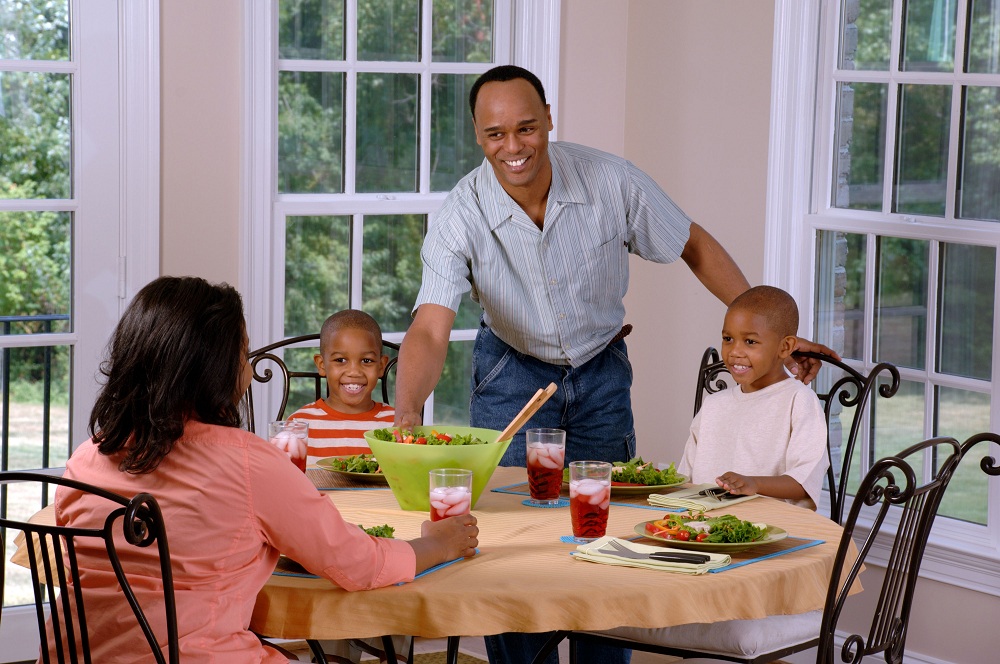It can be difficult to talk to children about health, especially if you’re not living an active and healthy lifestyle yourself. With 2 kids and a third on the way, my wife and I decided to change this by trying to eat healthier and squeezing in a few hours at the gym every week. It’s been tough, but we’ve been at it for a year now and I have to say, I’m seeing amazing changes already.
Translating this to your kids, however, is a different ballgame. My kids are 5 and 7 years old, just barely out of their toddler years. This means they love sweets, chocolates, basically anything that would give me diabetes. While there’s nothing wrong with letting them indulge once in a while, I don’t want them getting too attached. Lately, my wife and I started treating things like soda or candy bars as treats and rewards rather than as regular fixtures at home. I’m proud to say, though, that ever since my wife and I started living healthier, our kids have followed suit: they’re crazy for vegetables and our oldest is already showing a keen interest in sports (she’s a natural with hockey, although basketball comes at a close second).
We’re not health nuts, mind you; we’re just a family trying to make sure that our kids don’t suffer from obesity and future heart disease. Seems reasonable, right? We also want to steer them away from the idea that they always need to be ridiculously slim all the time (thanks MTV *rolls eyes*). In our journey to live a healthier, and therefore fuller, life, we learned a few things along the way that we’d love to share with parents who are going through the same thing. Here are a few words of advice.
Food is Neither “Good” nor “Bad”, So Stop Labeling Them Like That
When we started out trying to eat healthier, we did what any parent does when it comes to feeding their kids by categorizing food into polar opposites: good or bad. “Good” food is obviously fruits and vegetables, meat and start, anything that my own mom would call real food. “Bad” food was anything that was high in sugar, salt, or fat, and especially deep-fried ones. We tried to steer them away from “bad” foods and make them appreciate “good” food as much as possible.
While it was helpful, we learned that this wasn’t the best way to go around it. Labeling things as “good” or “bad” creates a judgmental mindset in your children. Let me explain: because all the “bad” food we discourage are really very tasty, the kids starting seeing them as secret indulgences, things that they can eat but in secret. We didn’t want that. So we shifted gears: instead of labeling them “good” or “bad”, we explained that some foods made you big, strong, and happy, while some foods were eaten only for fun. We emphasized that there wasn’t anything wrong with indulging on a candy bar every now and then, but it’s important that we see “fun” foods as controlled treats.
And it works: our kids now see chocolate, cake, cookies, even pizza, as special foods that we have every now and then. They look forward to it, but they don’t necessarily crave it, and when they do have it, they’re less likely to indulge. Sometimes, watching your language extends beyond curse words!
It’s a Process
There’s a reason that most children are picky eaters: they’re experience a lot of things for the very first time, not to mention their body is still developing all the processes we take for granted. My children are no exception; my youngest used to absolutely hate potatoes. He had this weird thing about its texture, and would cry every time he saw a big bowl of it on the table. Now, though, he can’t get enough of it!
Physiologically, kids have more taste buds than adults, so anything they put in their mouth, they will taste and feel in full force. This is why a lot of kids (including ours) had a hard time appreciating vegetables: the bitterness of leafy greens can be overpowering for someone with a full stock of taste buds. So take your time and be patient: new foods will be strange to kids, but with a bit of patience, you can get them to appreciate it. If they really don’t like it right now, don’t force it. Maybe it’s not the right time yet!

Make Cooking a Family Activity
When my wife and I started eating healthy, we had to start being mindful about the food we cooked. As much as possible, if we wanted something, we’d make it from scratch. The kids would see us laboring over our healthy food and we would involve them in the cooking process.
They loved it, and so did we! It was a great way to bond with the family after a long day at work and the kids saw it as another fun, learning activity. And one thing we noticed is that the more involved they were with cooking something, the more likely they were to eat and enjoy the food we made. One time, my wife made an okra quiche that was, frankly, not to my liking. But the kids were watching so I had to scarf it down. However, because the kids were there watching their mom make the quiche from scratch and lending a helping hand whenever they could, they absolutely loved it, and even had seconds!
Focus on Healthy LIVING
Obesity is one of the country’s leading childhood diseases, so it’s understandable that many parents will choose to control or restrict their kids’ weight. But we learned early on that this might not be the best approach to keeping them healthy. Telling your kids that they need to be a certain weight and that anything beyond that is unhealthy really takes a toll on their developing psyches. We didn’t want that, we wanted kids who were healthy, but still enjoyed being, well, kids.
So we did something different: we focused on encouraging healthy LIVING, rather than imposing a healthy WEIGHT. Aside from eating healthy, we also encouraged them to get into physical activities like sports or ballet or basically anything that would get them up and moving around. It was fun watching my kids try out new things, discovering activities that they enjoyed, and spending time together as a family. Our oldest is starting to take an active liking to hockey (something my wife is NOT super excited about, but she remains supportive!), while our youngest has been insisting we go rock climbing every Sunday.
Focus on giving your family an opportunity to live a healthy and active life, and move away from the idea that being a certain weight automatically means healthy.

Encourage Body Positivity
As they grow older, kids will be exposed more and more to mass media. While there’s nothing wrong with enjoying TV or Netflix shows, you need to be there to help them understand that, while celebrities have to look ridiculously slim and fit and tan all the time, kids don’t have to be. There’s nothing worse than a 7 year old worrying about not having a big butt just because her favorite celebrity has one. Always remind them that they are beautiful the way they are, and more than looking good, being healthy is more important.
No One is Perfect
Listen, we had a hard time too. It wasn’t easy getting active and healthy, and it was even harder getting the kids on board. We tried all sorts of things and advice from everyone, but we finally found our groove and we’ve stuck with it ever since. If you don’t get them interested in a healthy lifestyle immediately, that’s ok: try and try again! No one is perfect, no one parenting strategy is perfect either. Find your groove, and always remember to let your kids feel that you love them. Do those, and you’re already halfway through!



